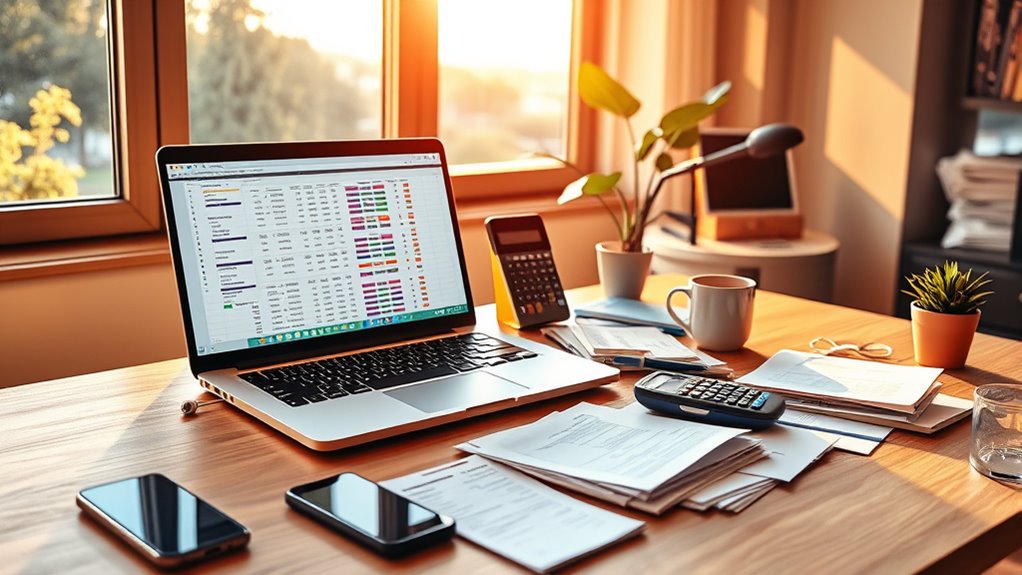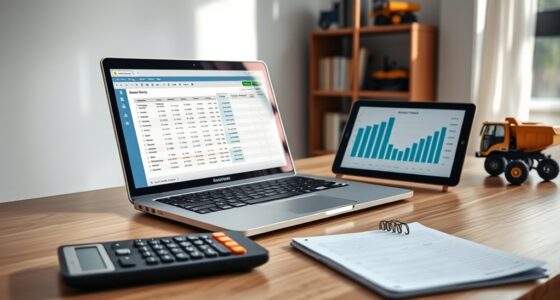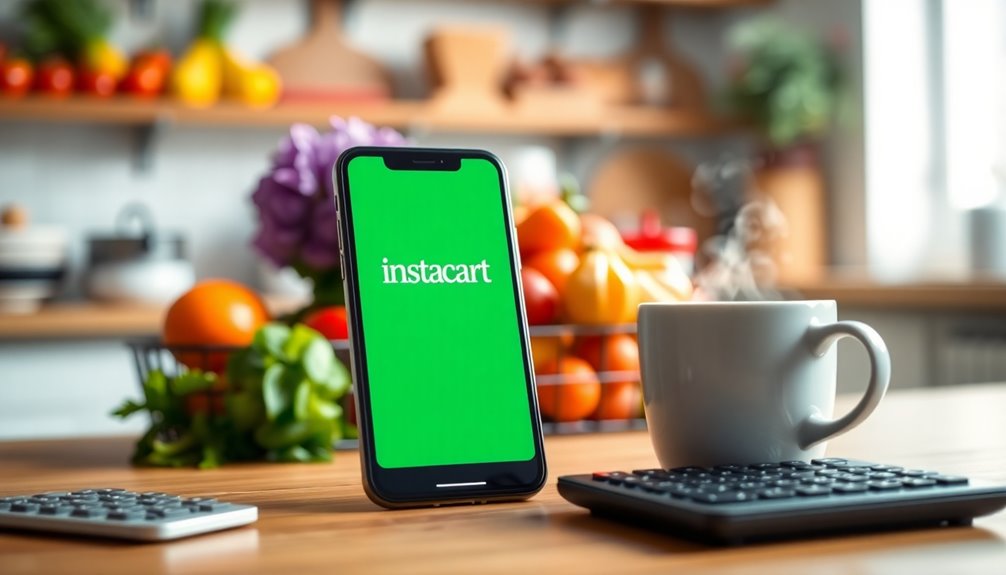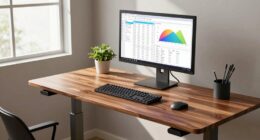In 2025, you can deduct many expenses related to your freelance work, such as a portion of your home office costs, utilities, internet, and supplies. Travel for business, professional development courses, books, and digital tools are also typically deductible if they directly support your work. Keeping detailed records and organized receipts helps maximize your deductions and stay compliant. To guarantee you’re covering all eligible expenses, continue exploring the full list of potential deductions.
Key Takeaways
- Home office expenses, including rent, utilities, and internet, are deductible if used exclusively for work.
- Office supplies and essential digital tools, like software subscriptions, can be deducted with proper documentation.
- Travel costs related to work, such as transportation, lodging, and meals, are deductible when directly tied to business activities.
- Expenses for professional development, including courses, books, and industry conferences, qualify as deductions.
- Maintaining organized records, separate business accounts, and detailed receipts helps maximize deductions and ensures audit readiness.

Are you aware of which business expenses you can deduct as a freelancer? Understanding this is essential because it directly impacts your tax deductions and overall profitability. When you keep good expense tracking habits, you can identify all the costs related to your work that are eligible for deduction. This not only reduces your taxable income but also guarantees you’re not leaving money on the table come tax season.
First, it’s important to recognize that many common expenses can qualify as deductible business costs. For example, if you work from home, a portion of your rent or mortgage interest may be deductible, provided you allocate the space exclusively for work. Keep records of your utility bills, internet service, and maintenance costs related to your home office, as these can add up and considerably lower your taxable income. When it comes to expense tracking, maintaining detailed receipts and records makes it easier to substantiate these deductions if you’re ever audited.
Office supplies are another straightforward deduction. Pens, paper, notebooks, and printer ink are small expenses but add up over time. Don’t forget about digital tools and subscriptions, such as cloud storage, design software, or project management platforms, which are essential for many freelancers. These costs are deductible, but you need to keep track of your subscriptions and purchase receipts to maximize your tax deductions.
If you travel for work, keep detailed records of your expenses, including transportation, lodging, meals, and even parking. Business trips are deductible as long as they are primarily for work purposes. Remember, the IRS requires that these expenses be directly related to your work, so always document the purpose of your travel and keep copies of receipts and itineraries.
Professional development expenses are also deductible. Courses, workshops, industry conferences, and even books or online resources relevant to your field can be deducted if they enhance your skills or knowledge. Again, expense tracking is essential here—save receipts and keep a log of how each expense relates to your business.
Additionally, understanding the importance of vetted products can help ensure you’re choosing safe and effective tools to support your work. Finally, don’t overlook the importance of separating personal and business finances. Having a dedicated business bank account makes it easier to track expenses accurately. Using accounting software can automate much of this process, helping you categorize your deductions correctly and stay organized. When you stay diligent with expense tracking and understand which costs are deductible, you’ll find it’s easier to maximize your tax benefits and keep your freelancing business financially healthy in 2025.
Frequently Asked Questions
Are Home Office Expenses Fully Deductible for Freelancers?
Yes, you can fully deduct your home office expenses if you use a dedicated space exclusively for freelancing. The home office tax deduction covers a portion of your rent, utilities, and other related costs. To qualify, your space must be your principal place of business. Proper documentation helps maximize your freelancing deductions, ensuring you’re accurately claiming all eligible expenses without overstepping IRS rules.
Can I Deduct Travel Expenses if I Work Remotely?
Yes, you can deduct travel expenses if you work remotely, but only if the travel is directly related to your freelance work. Keep records of your expenses and consider applying for travel reimbursement when possible. You can deduct costs like transportation, accommodation, and meals, but personal travel isn’t deductible. Make sure to distinguish between work-related trips and personal travel to stay compliant with tax rules.
What Qualifies as a Business Meal Deduction?
You can deduct meal expenses if they’re directly related to your business, like meetings with clients or potential partners. To qualify, the meal must be necessary and reasonable, and you should keep receipts. Entertainment expenses, like tickets to events, aren’t deductible unless they include a meal component. Keep detailed records of who, when, and where the meal took place to support your meal deductions.
Are Subscription Services Deductible if Used for Both Work and Personal Use?
Yes, subscription services used for both work and personal purposes can be deductible, but only the portion related to your business. To handle subscription overlap or mixed-use subscriptions, you need to allocate the expenses based on the percentage of business use. Keep detailed records of how often and for what purpose you use the service to justify the deduction if audited. This way, you verify you’re claiming only the appropriate deductible amount.
How Do I Document Expenses to Maximize Deductions?
Think of your expense tracking like tending a garden—you need to be meticulous. To maximize deductions, stay on top of receipts management and categorize expenses carefully. Keep digital or physical copies of receipts for every purchase, noting the date, amount, and purpose. Use bookkeeping apps to streamline this process, ensuring each expense is properly documented. This way, when tax time comes, you’ll have a well-organized garden ready to flourish with deductions.
Conclusion
Understanding what counts as deductible expenses in 2025 is like having a well-organized toolbox—you’ll be ready for any financial challenge. By keeping track of your business costs, you can save more and keep your finances healthy. Remember, every expense you deduct is like a small victory, helping your freelance journey stay smooth and successful. Stay informed, stay organized, and watch your business thrive like a well-tended garden.








